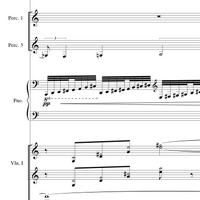Snapshots: Miroslav Srnka
|
Dan Albertson [February 2014.]
Miroslav SRNKA: Piano Concerto (2012). Nicolas Hodges (pf), ORF Radio-Symphonieorchester Wien, Cornelius Meister (cond.). Première: Großer Saal, Musikverein, Vienna, November 23, 2012. Piano concertos are experiencing a surge – and not merely from populist corners of the musical spectrum. Nicolas Hodges is responsible for many of the more ‘advanced’ contributions to the genre. In the past three years alone, I have heard him in new concertos, not all of them labelled as such, by Georges Aperghis, Hugues Dufourt, Michael Jarrell, Isabel Mundry, Brice Pauset, and Miroslav Srnka. The last composer is the one whose work left the greatest impression for a multitude of reasons. Srnka, born in 1975, was trained as a musicologist before falling into composition. He has chosen to remain in Prague instead of moving to a more fashionable city. His music, while not resembling Janáček in any way, shares with the pride of Hukvaldy a degree of resistance to classification. His aesthetic stance shows no obvious affiliation. His sound is neither sweeping enough to be neo-romantic nor noisy enough to put him among the Lachenmann clones; neither is his work based on the analysis of overtone series nor crass enough to owe a debt to commercial music, both trends that should have died in the 1980s. His piano concerto, dedicated to the memory of his teacher Milan Slavický, is not showy. The soloist often has the least appealing role, replete with scales and a slow shifting of basic motifs. The orchestra is the focal point from the outset when an unsteady figure emerges from the low strings. The work entrances as it clothes the soloist in a subdued, assured set of orchestral guises, never oppressive but also far from irrelevant. The effect is remarkably nimble. When the piano is silent, one scarcely notices. Moments with sustained strings against the piano in its highest register are especially engaging. A recurring motif on three temple-blocks is surprisingly endearing. In view of the sorry state of contemporary music, I could pay no greater compliment to a new piece than to wish to listen to it more than once. I have listened to this concerto at least five times.
[More Dan Albertson, Snapshots]
[More
Srnka]
[Previous Article:
Concerto Concentrations 1.]
[Next Article:
Mostly Symphonies 25.]
|
